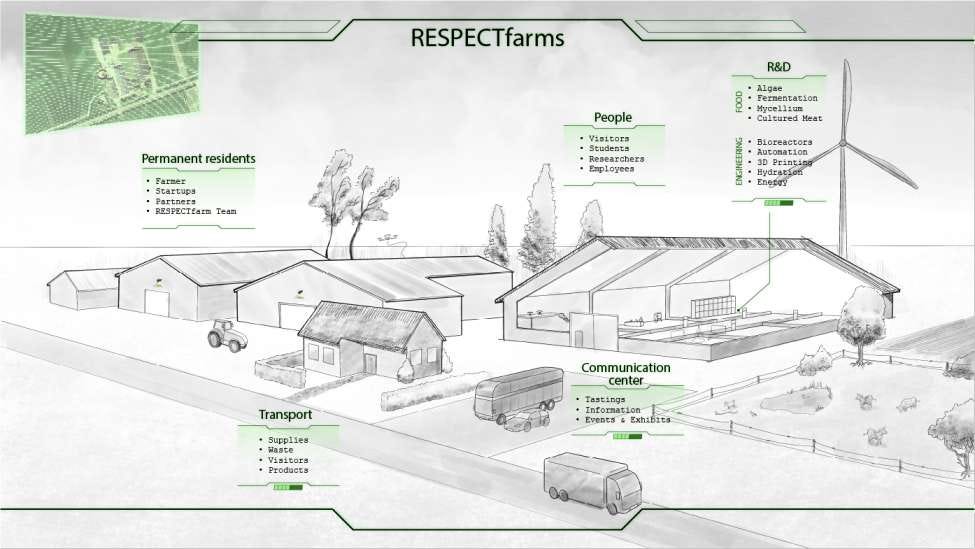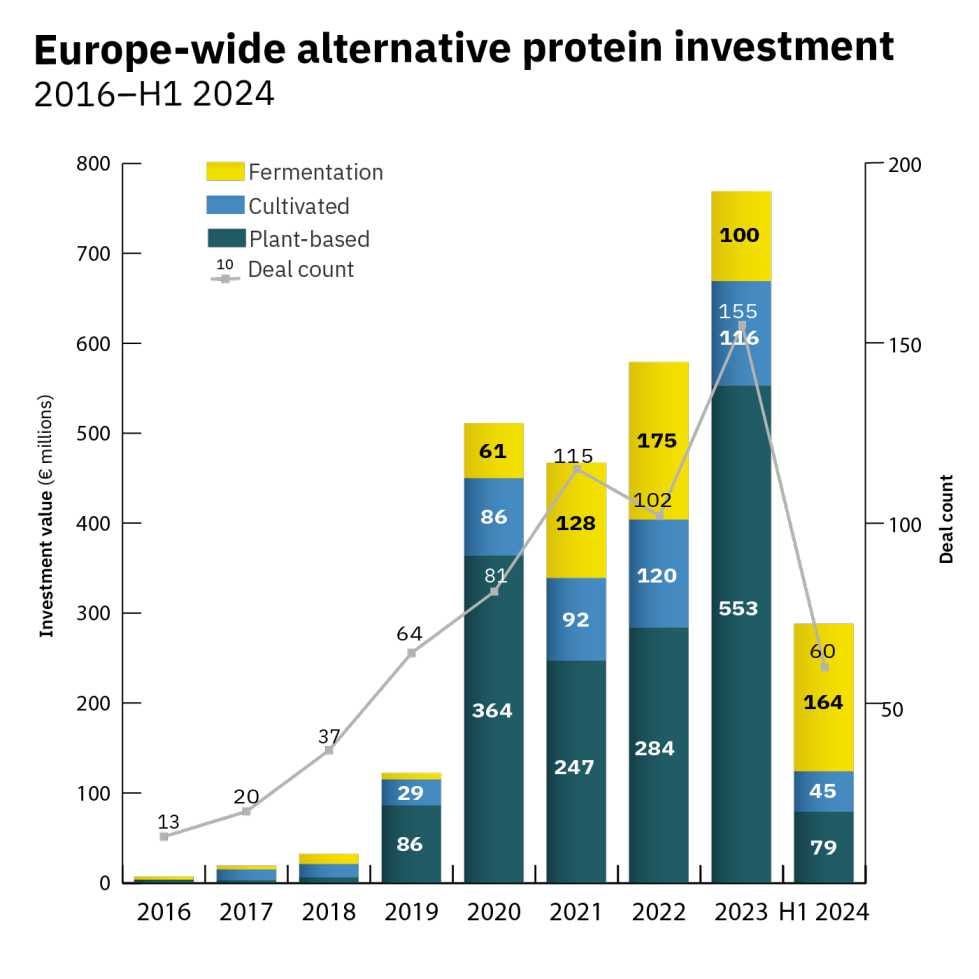Air-Based Mooncakes, High-Protein Potatoes, and European Fermentation Domination
Also: Why Australia is strongly positioned to lead the alt protein sector
Hi, welcome to issue #69 of the Better Bioeconomy newsletter. Thanks for being here!
Here’s my favourite quote that I came across while working on this week’s issue:
"We see a future where livestock farming, regenerative agriculture and other forms of agriculture create synergies with cellular farming. It will be a future where we will have bigger production facilities that serve a certain customer group on the one hand, and farms that can serve a different customer group on the other hand, comparable to what we see in the brewery industry today."
- Florentine Zieglowski, co-founder of RESPECTfarms
Let’s dig into the latest developments in biotech, shaping the future of food! 🍽
BIO BUZZ
🥮 Solar Foods and Ajinomoto introduced two Solein-powered products in Singapore under Ajinomoto's new brand Atlr.72
The new products, traditional flowering mooncakes and ice cream sandwiches are the first to be launched under Atlr.72.
Solein is a versatile protein created from air. It’s produced by growing a microbe through a fermentation process that uses air and electricity. Solein is set to enter the US market soon and gain novel food approval in the UK and the EU.
The partnership between Solar Foods and Ajinomoto, initiated last year, aims to pilot Solein-based products in Singapore and expand to other regions.
Source: The Cell Base
🥔 ReaGenics created cell-based potatoes with 31% protein content, much higher than the typical 2%
The Israeli startup’s product could potentially have a 40% protein content. The protein is non-GMO, highly soluble, and possesses various functional properties, including gelling, foaming, and emulsifying.
The primary market is currently for animal feed, but there is potential for food applications. ReaGenics is working with companies to produce potato biomass at scale under license.
The potato protein needs to pass regulatory approvals in the US and Europe. Potential applications include plant-based meat analogues, plant-based milk, and addressing malnutrition, affecting over 45 million children globally.
Source: Green Queen
🥛 Tomorrow Farms launched Bored Cow animal-free milk into Target, featuring Perfect Day's precision-fermented whey protein
The available products include a 32oz Original flavour carton and four-packs of 11oz chocolate and strawberry variants, with a limited-edition Pumpkin Spice flavour exclusive to Target.
Target, a major retailer with over $105.84 billion in sales last year, is the largest retailer to carry Bored Cow products.
Bored Cow milk combines Perfect Day's bioidentical whey protein with other ingredients like sunflower oil, cane sugar, and natural flavours, fortified with vitamins and minerals.
Source: Green Queen
🤝 Primient and Synonym teamed up to accelerate bioproduct innovation and commercialization in the US
The partnership fast-tracks the development of next-generation bioproducts by combining Primient's extensive experience in bioproducts and manufacturing with Synonym’s advanced biomanufacturing platforms and digital tools.
The first project, iPROOF, will upgrade fermentation assets at Primient's Decatur, IL facility. Funded in part by a U.S. Department of Commerce Tech Hub Grant, iPROOF aims to create a platform for companies to scale up their precision fermentation products from pilot to commercial scale.
The partnership will provide extensive support to companies across various stages of product development. This will help overcome barriers to market entry, allowing faster and more efficient commercialization of bioproducts.
Source: Business Wire
🍝 Equii expanded its microbial protein product range into pasta rich in protein and fibre
The Californian startup expanded its product line to include protein-rich pasta varieties like rigatoni and mac and cheese, enhancing its portfolio beyond its complete-protein breads.
The new pasta products are 4-5 times higher in protein and fibre than conventional options. Rigatoni contains 28g of protein (with all 9 essential amino acids) and 10g of fibre per 100g, and mac and cheese offers 19g of protein and 6g of fibre per 100g.
The products cater to the increasing consumer demand for high-protein and high-fibre foods, aligning with current trends and dietary concerns, such as the GLP-1 craze and America's fibre deficiency.
Source: Green Queen
🌽 BioLumic partnered with seed companies to improve corn productivity using light-activated Genetic Expression Trait™ technology
Following successful 2023 field trials, BioLumic is partnering with Beck’s Hybrids, Peterson Corn Genetics, Peterson Farms Seed, Breeder Direct, and other seed companies to enhance inbred and hybrid corn productivity.
2023 field trials showed a yield increase of over 7.3% in treated inbred corn lines. The goal is to achieve double-digit yield gains through improved germination and seedling vigour.
BioLumic’s technology uses UV light to activate genetic expression in plants, enhancing yield and plant defence traits without genetic modification or chemical additives. The technology is set for commercialization in 2025.
Source: SeedWorld
🧫 University of Georgia’s CytoNest launches 3D fibre scaffold for cultivated meat and seafood as first commercial product
The CytoSurge 3D scaffold is an edible, fibre-based structure made from GRAS materials. It can also be used in cell research, biopharmaceuticals, and cell therapeutics.
The product features ultra-long strands created using CytoNest’s proprietary fibre drawing technology. These fibres are fused or overlaid to form a multilayered 3D scaffold, supporting cell cultures to attach and grow.
Georgia Research Alliance, Good Food Institute, and US Department of Agriculture grants funded the product development.
Source: vegconomist
🔬 Germany’s Rostock University Medical Centre is researching cultivated meat to boost sustainable production and cut emissions
The Federal Ministry of Food and Agriculture, under the innovation funding programme, is funding the project until 2025.
The project entitled MOSTIME, in collaboration with Innocent Meat, aims to produce genetically modified-free meat from adult pig stem cells without slaughtering.
Initial results show a strong proliferation of skeletal muscle cells through electrical stimulation. Three reprogramming procedures have been developed, with a focus on commercial production methods.
Source: vegconomist
🇧🇷 Typcal pioneers mycelium fermentation in LATAM using a unique organism that grows rapidly on a variety of feedstocks
The Brazil-based startup collaborates with major partners like AB InBev, using spent yeast and various side streams to optimize biomass production and nutritional profiles.
Typcal has raised $3M in seed funding, and it’s looking to raise a series A round later this year. Plans include scaling up to commercial production with a 5,000-liter bioreactor by 2025 and further expansion by 2026.
Product offerings include fresh biomass, dry powder, and mycelium concentrate for various food products. It emphasizes clean-label ingredients and targets markets such as meat alternatives, snacks, and sports nutrition.
Source: AgFunder
👩🏽🌾 RESPECTfarms enables farmers to integrate cellular agriculture into their operations
The company offers a fully automated, plug-and-play system designed specifically for farmers. This system simplifies the process of adopting new technologies, making cultivated meat production more accessible to traditional farmers.
RESPECTfarms believes that conventional farmers can generate value and income from this new form of agriculture, which aligns with its broader goal of building a more sustainable and resilient food industry.
It acts as a system integrator, bridging the gap between farmers and biotech firms by providing the necessary production systems, technology, and regulatory support. RESPECTfarms anticipates that farmers will begin producing significant amounts of cultivated meat around 2030.
Source: The Cell Base
MACRO STUFF
🇦🇺 Why Australia is strongly positioned to lead the alt protein sector
Australia has a unique combination of essential resources, including access to raw materials and advanced R&D capabilities. It’s a major producer of legumes, such as lupin seeds, which are vital for producing high-protein plant-based foods.
The country enjoys favourable market opportunities, particularly in Asia, where there is a growing demand for alt proteins. This positioning allows Australia to tap into a lucrative export market.
Australia has attracted substantial investment in the alt protein sector, including public-sector funding and private-sector investments. These investments have helped catalyze the growth of companies working in precision fermentation and cultivated meat.
Source: Green Queen
🇨🇳 China surpasses the US in protein consumption, driven by plant-based dominance
In 2021, Chinese nationals consumed 124.61g of protein per capita daily, slightly more than the US average of 124.33g, according to UN FAO data.
60.5% of China's protein comes from plant-based sources, while in the US, 69% is derived from animal products. Despite the dominance of plant-based sources, China's meat consumption is expected to increase, driving government interest in alt proteins.
Iceland tops the global list with 145.62g of protein per capita. In contrast, countries like the Democratic Republic of Congo and India have much lower per capita protein supplies, with 28.59g and 70.52g, respectively.
Source: Green Queen
BIO BUCKS
🇪🇺 European fermentation startups raised €164M in H1 2024, surpassing the €100M raised in all of 2023
This represents 57% of the €287M raised by the alt protein sector in the same period.
By the end of June 2024, biomass fermentation startups had raised just over €115M, a 72% increase from the €67M raised in 2023. Precision fermentation startups raised €49M in the first half of 2024, up from €33M in 2023.
Despite increased private investment, the fermentation sector faces bottlenecks due to a lack of infrastructure, and there are calls for government support to scale up facilities.
Source: Green Queen
APAC AGRI-FOOD INNOVATION SUMMIT
🤝 Meet 1000+ global leaders who are accelerating climate-adaptation strategies for food security in Asia
Better Bioeconomy is excited to be a media partner for the Asia-Pacific Agri-Food Innovation Summit, taking place at Marina Bay Sands on November 19-21!
As the anchor event of Singapore International Agri-Food Week (SIAW), in collaboration with Temasek, the Singapore Food Agency (SFA), and Enterprise Singapore (ESG), the Asia-Pacific Agri-Food Innovation Summit will bring together over 1000 global leaders to identify the strategic priorities as we build greater capacity, security, and resilience in Asia’s agri-food system.
🙌🏾 Use my discount code ‘BIO10’ to save 10% – offer ends Thursday, August 29.
MORE ON BETTER BIOECONOMY
💬 My conversations with bioeconomy innovators
Biotech consultant and ex-CSO of Vow, James Ryall: Bridging Science and Business to Support Startups Using Biomanufacturing
Synonym's co-founder, Joshua Lachter: Financing and Developing Infrastructure for the Bioeconomy
Bioshyft's founder, Gerrit Feuerriegel: Connecting Innovators, Investors, and Incumbents to Drive the Bioeconomy
Terra Bioindustries’s CMO, Rebecca Palmer: Turning Agrifood Byproducts Into Nutrient-Rich B2B Ingredients
That’s a wrap. Thank you for taking the time to read this issue!
Are you new here?
Know anyone else who would dig this newsletter?







